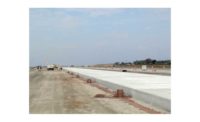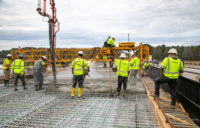 AP Pelosi, Reid will set congressional agenda thatcould benefit construction.
|
The Democrats’ takeover of the Senate and House in the Nov.7 elections, the biggest shift since the Republicans won the House in 1994,redraws the legislative landscape for construction firms, unions andenvironmental groups. The ascendant Democrats are expected to be at least asstrong as the GOP on the bread-and-butter issue of infrastructure spending.
In the Senate, Democrats picked up six seats, for a 51-49edge, counting independents Joseph Lieberman (Conn.) and Bernard Sanders (Vt.),who are expected to vote with them. Preliminary House results show Democratsgaining 28 seats, giving them a majority of 13 over the GOP. The results willmake Sen. Harry Reid (D-Nev.) majority leader and Rep. Nancy Pelosi (D-Calif.)House Speaker. There also will be a set of new committee chairmen when the 110th Congress convenes in January.
Republicans will stay in control for a lame-duck sessionthat began Nov. 13. Industry officials don�t expect the session to producemuch, though some hold out hope for water resources and SAFETEA-LU �correction� bills. Themust-pass items are the unfinished 2007 appropriations. Cathy Connor, Parsons Brinckerhoff senior vice president for government affairs, expects lawmakers towrap most of the spending bills into a continuing resolution. She asks, �Ithink the bigger question is: Do they do a longer CR?� That could extendthrough Sept. 30, when fiscal 2007 ends.
Stephen Sandherr, Associated General Contractors’ CEO,doesn’t see big changes on public works funding in the 110th Congress.“Infrastructure spending typically enjoys bipartisan support,” he says. Theremay be some daylight on sewage treatment and drinking water legislation, whichhas stalled over Davis-Bacon Act issues. “That likely won’t be an impediment inthe House anymore,” Sandherr says.
The new Congress will be “kind of a mixed bag” for theindustry, says Steve Hall, American Council of Engineering Companies’ vicepresident for government affairs. “I think the results give us some newopportunities in the areas of infrastructure funding,” such as in aviation,Hall says. But industry-backed issues such as small-business health plans andtort reform “are going to be a bigger challenge,” he says.
Terence O’Sullivan, laborers’ union general president, sayshe was “elated” by the election results. O’Sullivan says voters indicated theywere looking for results from Congress. “We’re certainly hopeful that there’sgoing to be bipartisanship,” he says, and “instead of playing ‘stall ball’here, Congress will move progressive legislation forward....”
Environmental groups foresee a “greener” Congress. League ofConservation Voters President Gene Karpinski hopes oil drilling in the ArcticNational Wildlife Refuge will be “off the table.” But the White House is likelyto oppose the greens on at least some issues. Cathy Duvall, Sierra Clubpolitical director, says, “Even if we pass something, President Bush still sitsin the White House.”
Democrats have “only a two-year window” to show legislativeresults, says Casey Dinges, American Society of Civil Engineers’ managingdirector for external affairs. “The presidential [race] is going to startunfolding, which makes you kind of wonder how much progress is really going tooccur in the next two years. If that’s the case, the public may have someheightened expectations about how quickly things are going to ‘change,’ becausewe’re in such a political environment now.”



Post a comment to this article
Report Abusive Comment